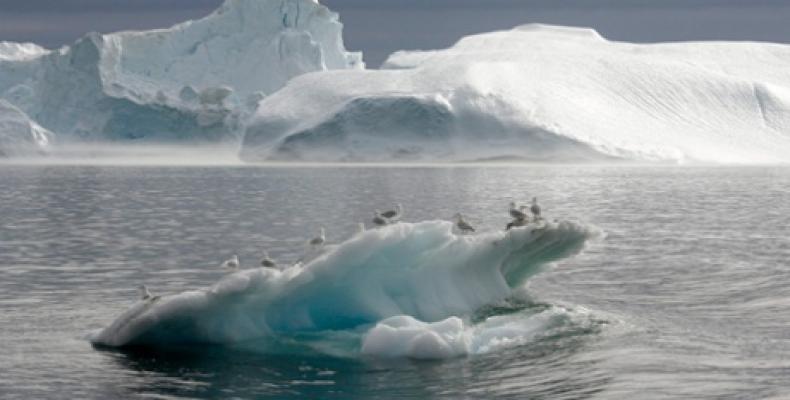A new paper has found sea level rise is half due to melting ice and half due to ocean warming, including 13 percent from the deepest oceans, according to a report by John Abraham of the Guardian newspaper.
There have been a number of studies recently on ocean warming and sea-level rise. Collectively, they are helping scientists unite around an emerging understanding of climate change and its impact on the Earth.
Most recently, a study by scientists Sarah Purkey, Gregory Johnson, and Don Chambers was published in Journal of Geophysical Research 'Oceans'. This team was responsible for a 2010 paper that was groundbreaking in that it quantified very deep (abyssal) sea warming. This latest paper is, in some respects, a continuation of that work.
The researchers recognized that changes to sea levels are mainly caused by thermal expansion of ocean waters as they heat, changes to the saltiness of water, and an increase in ocean waters as ice melts and flows into the sea. The total annual sea level rise is about 3mm per year – the question is, how much of that is from expansion and how much is from melting?
The researchers used a few tools to answer this question. One tool was ocean bottom pressure measurements. If you can measure changes to ocean pressure, you can deduce how much water is in the ocean. Another tool is through an inventory approach. This inventory method quantifies how much glaciers retreat, polar ice melts, and changes to water storage on land. The paper reports that both methods agree with each other. They conclude that increased water in the oceans is causing between 1.5–1.8 mm per year of sea level rise, depending, in part, on which years are under consideration.
The authors do not consider the ocean as a whole. They break the ocean regions into seven different sections because the change to ocean levels is not uniform. In some regions, waters are rising quickly, in others, the rise is much slower or zero. One reason for regional variability is that the Earth’s gravity is changing.
There is so much ice in Greenland and Antarctica that is melting and flowing into the ocean, the mass of these two regions is being reduced; therefore, the pull of gravity toward Greenland and Antarctica is changing. As a result, water levels near Greenland and Antarctica may actually fall as those ice sheets melt.
But, ocean levels elsewhere, particularly U.S. coastlines, will rise more than average because of this same effect. I have a paper in press with Ted Scambos on this very topic that should be published in a few weeks.
Another reason sea level rise is not uniform is that there are local changes to heat and salt which can increase or decrease water density in certain regions, causing local changes to sea level. A third reason is that changes to wind patterns can slosh water around, causing it to build up in one area, fall in another.
In each of the seven ocean regions, the researchers collected temperature and salt measurements at carefully distributed sections. These measurements allowed them to calculate how much of the ocean rise is due to heat/salt effects. They compared the expected sea level rise to actual satellite measurements. The difference between expansion sea level rise and actual sea level rise is the contribution by melt water which flowed into the ocean. This method they call the residual measurement.
Then, they collected measurements from special satellites (GRACE) which measure local fluctuations in ocean mass. They compared the GRACE results with the residual measurement. It turns out they were in near perfect agreement; 1.5 mm per year of sea level rise is from added mass to the oceans. The rest is from expansion. Not only did the two methods agree, but they agreed region by region. They showed, for instance, that the South Atlantic and the South Indian/Atlantic Oceans are rising very rapidly. The North Pacific, South Pacific, and Indian Oceans are rising modestly. The southern Pacific is falling modestly and the North Atlantic is basically constant.
Next, they calculated the relative sea level rise for waters from the surface down to different depths (300, 1,000, 2,000, 3,000, 4,000, and 6,000 m) to determine which layers make the largest contributions to sea level rise. The authors report that the deeper we go into the ocean, the less heating has occurred (this is expected and well known). Interestingly, they find that every water layer, even the deepest waters, have contributed some to sea level rise. They also report that the sea level rise contribution from the layers 300-2,000 meters is much more than previously reported.
Dr Johnson talked about their results, “We find a small but measurable contribution from deep-sea warming to the global sea level budget (and hence global energy budget) from 1996–2006. The ocean warming is estimated directly from highly accurate, full-depth, oceanographic temperature data. The magnitude of the deep warming contribution to sea level below 2,000 m is about 13% of the total contribution of the mass trend below 2,000 m for that same time period.”
Both studies show that the deepest ocean waters are likely contributing only a small fraction to the overall ocean energy/water rise. On the other hand, the uncertainty is largely because the deepest waters just don’t have a history of sufficient measurements to close the uncertainty range. He also stressed the importance of a proposed fleet of deep-water measuring devices (Deep Argo).
It is sometimes said that “global warming” is really “ocean warming”. Given the importance the oceans have on our past and future climate, you can be sure scientists around the world are working to better understand how much heat is going into the oceans, where the heat is going, and what will happen in the future. The recent publications are helping us close the uncertainty range and improve our knowledge. This is what progress looks like.


